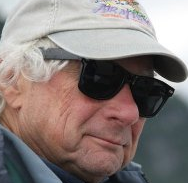2016 Elections May Challenge The Strength of U.S. Diversity
By Joe Rothstein
Editor, EINNews.com
In the days before Iowa voted I traveled, not to Iowa but to New Mexico. And not for politics, but for art.
Politics, of course, travels with you these days. No escaping it. Even at 6 a.m. Sunday morning, waiting for plane boarding, there was John King, leading a CNN roundtable on what to expect out of Iowa. The sound was muted, but it didn’t matter. We’d heard it all before, endlessly.
The art, though, was fresh and informative. Santa Fe is an American gem, daring you to pass any store front without pulling you in to explore paintings, jewelry, sculptures, silver, textiles and exotic objects seen seldom elsewhere, all packed into a few square blocks and one short canyon walk. In contrast to Santa Fe’s village-like environment Albuquerque is a more typical mid-size U.S. city. Its art, also compelling, is centered mostly in the area known as Old Town and the cluster of museums nearby.
There’s politics in all of this, more enduring than cable TV’s news cycle: the politics of diversity, the deeply embedded structural framework that makes and keeps the U.S. such an admirable nation, and protects us from whatever ill winds might be blowing in the temporal world.
When Americans in the original colonies were fighting for independence from England, and for many decades after, New Mexico was an integral part of Old Mexico, as was Texas, Arizona and California. You can’t travel through these states without being aware of that background. The very names of towns and cities, streets and highways, the architecture, the names of businesses. American to the core now, but sharing roots with the region’s past, enriching the U.S. through its diversity.
Before Mexico and Spain there were the Navajos and Hopis and a variety of other indigenous cultures. A visit to Albuquerque’s Indian Pueblo Cultural Center takes you through the history 19 Pueblos, each with its own background and contemporary life. Much of the work on display is remarkable for its creativity and craftsmanship.
A few blocks away, the Hispanic Cultural Center, not just a museum but a place where Americans celebrate their Hispanic roots, as so many other Americans celebrate theirs. In Cedar Rapids, Iowa, for example, you will find the National Czech & Slovak Museum and Library and an active community whose forebearers came to the U.S. from Eastern Europe.
Travel to Minnesota and the Dakotas and you meet many people named Lars, Nils and Lena, even today, generations later, tied by name and custom to Scandinavia. Go to Maine, where many are comfortable speaking French, or Louisiana, where French culture and a form of the language remains strong. “Chinatown” exists not only in San Francisco, but in Los Angeles, New York, Washington, D.C. and elsewhere, complete with written Chinese characters to identify places of business. In many U.S. cities you find vibrant clusters of those who proudly trace their backgrounds to families in Italy, Greece, Germany, Korea, Vietnam, Russia, or a Middle Eastern nation.
For all the talk about America being a cultural melting pot, the truth is that we are and are not. The endurance of identification with ancestral lands is powerful, just as is the allegiance to both the reality of the United States and its ideals.
I don’t need to travel to meet up with Americans who migrated from Latin countries. More than 10% of the population of Washington, D.C., where I live, is of Hispanic origin. But this community is relatively new, living in a city built on earlier foundations. New Mexico is a community built firmly on the dual past of Old Mexico and Navajo and Pueblo nations and the strength and creativity of those cultures. And it rings so discordant against what we’re hearing from so many of the Republican candidates, not just Donald Trump.
Immigration policy is certainly a topic that can and should generate passionate opinions about proposed remedies. But the Republican debate has gone beyond policy into caricatures of Latin heritage. Rape and rob? Us against Them? Go back where you came from? My grandparents and parents were Russian Jews. They heard plenty of that. So did the Irish and Italians. And countless others.
Racial and ethnic intolerance is a proven way to win advantage with many voters. But it's a dangerous threat to the nation's core strength of tolerance and diversity. Hopefully, voters in all the upcoming primary states will punish any candidate who preaches it.
(Joe Rothstein can be contacted at joe@einnews.com)




